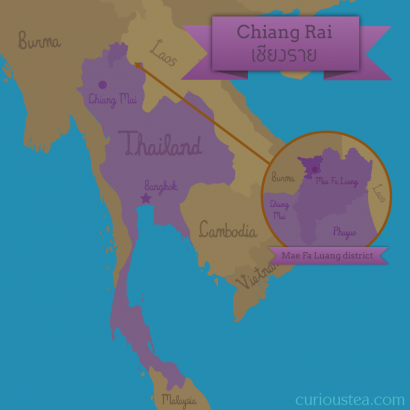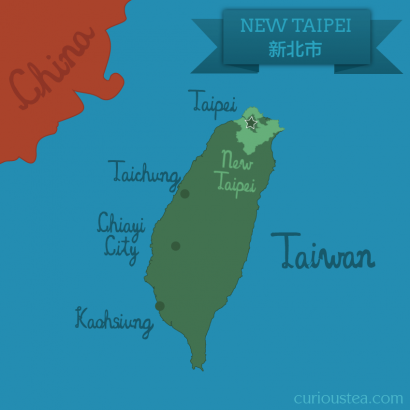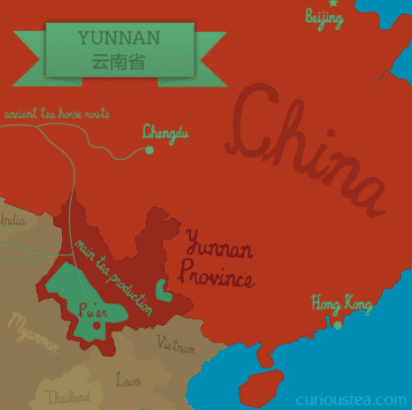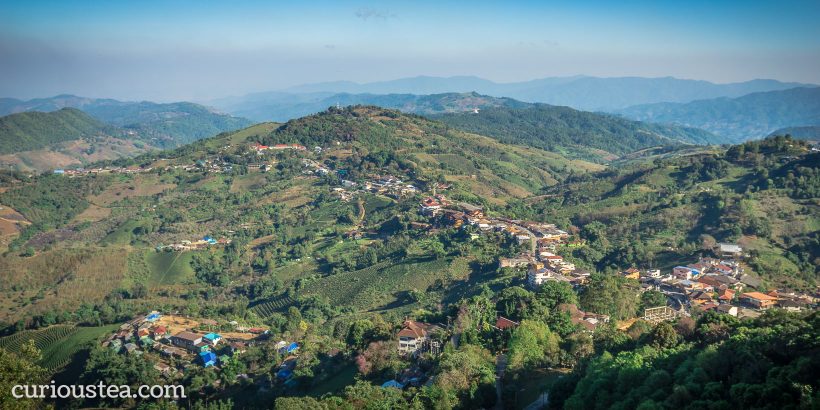Welcome to the November 2021 edition of the Curious Tea subscription! Here’s a closer look at the four exciting new teas that we are sharing with our subscribers this month.
The first light tea this month is an early spring green tea from Sanxia District in Taiwan that is a take on a classic verdant Long Jing tea but featuring an intriguing floral note.
The second light tea is a classic Milk Oolong that is grown in the highlands of Doi Mae Salong in northern Thailand and is lightly oxidised to deliver a verdant flavour.
For the dark side of the selection we have a unique Dian Hong from Yunnan Province made from from the rare Camellia taliensis plants that produces a smooth malty taste.
Finally, the last tea we are featuring this month is a highly oxidised ‘Ruby’ version of the Santikhiri Milk Oolong above that produces a golden flavour with a fruity honey note.
Our Discovery subscription boxes contain 10g taster pouches of all of the above mentioned teas. If you are a subscriber you will benefit from a 10% discount on all teas from our tea shop!
Let’s get into further detail on these teas featured in our November tea subscription boxes.
Santikhiri Milk Oolong
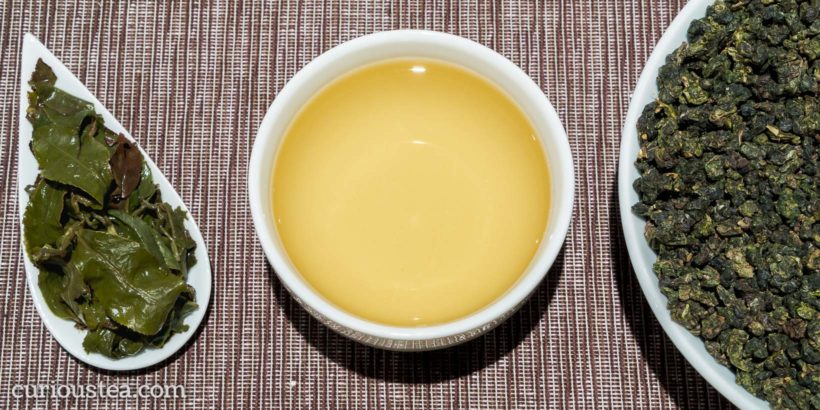
Santikhiri Milk Oolong is a characterfully smooth, lightly oxidised oolong that is produced from a Taiwanese Jin Xuan TRES #12 cultivar. This oolong comes from around Santikhiri village (formerly Mae Salong) located in Mae Fa Luang District around the highlands of Doi Mae Salong mountain, close to the border with Burma and Laos. Santikhiri Milk Oolong is an organic tea grown at an altitude of around 1,200-1,600 metres and this particular lot was plucked in April 2021. We source this tea directly from the owner of the plantation in Doi Mae Salong.
This Milk Oolong tea is made from a Taiwanese cultivar called Jin Xuan ‘Golden Daylily’ (金萱) or TRES #12, the number given to it by the Taiwan Research and Extension Station. Milk Oolong is also sometimes known as Nai Xiang (奶香) ‘Milk Fragrance’ in Chinese. The Jin Xuan cultivar is very popular with farmers since the plants are more hardy and produce a higher yield. From a tea lover’s point of view, Jin Xuan is an attractive aromatic drink with a lovely sweet and creamy character.
Unfortunately there are plenty of Milk Oolong teas (whether from Jin Xuan cultivar or others) that are flavoured either with milk or vanilla in order to imitate or enhance the natural taste that the leaves of Jin Xuan develop. Any genuine Milk Oolong, such as this one, is always produced from the Jin Xuan cultivar and should not be flavoured or enhanced with additional flavours in any way.
Santikhiri Milk Oolong comes in tightly rolled dark green leaves that produce a brisk yellow-green clear liquor with a lightly verdant and creamy aroma. This tea produces a light cup that is smooth and refreshing. The taste is vegetal, lightly ‘green’ tasting, with a tangy edge. There is distinctive creaminess that this type of tea is famous for, which mostly comes in at the very top notes and on the aftertaste. The creaminess and milkiness is manifested mostly in a mouthfeel rather than a distinctive milky taste. The aftertaste is long-lasting and has a lovely nutty top note. When compared to other Milk Oolong teas that have a more pronounced milky and creamy flavour and mouthfeel, especially our award-winning Organic Milk Oolong, this tea has a more lightly-oxidised fresh green flavour with a light, characteristic Jin Xuan creamy mouthfeel.
We suggest brewing at 90°C for 3-4 minutes according to your taste. It can be brewed 3+ times.
You can also buy Santikhiri Milk Oolong tea in our online shop.
San Xia Ming Qian Long Jing
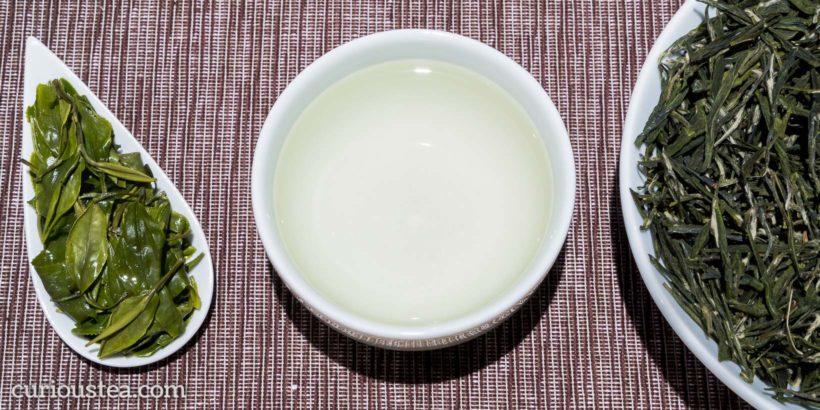
San Xia Ming Qian Long Jing (三峽明前龍井) is an early spring (pre-Qing Ming) Dragon Well green tea from Sanxia District of New Taipei City in northern Taiwan. Carefully handpicked leaves of the Qing Xin Gan Zi varietal are processed in a style similar to the traditional Long Jing, whereby the leaves are flattened during pan-frying. Unlike traditional Long Jing from Mainland China, the leaves are not flattened completely and are much longer and wirier. The resulting liquor is bright with a smooth sweet taste and creamy vegetal notes. Grown at an altitude of between 300m and 400m, it was hand harvested and processed in March 2021 by the Lee family. You may also be interested in an early spring Bi Luo Chun from the same producer.
Long Jing ‘Dragon Well’ is a classic, and perhaps the most popular Chinese green tea. The original hails from the core Xihu (West Lake) tea growing area in Hangzhou Province. For comparison to the more original versions, we recommend looking at our West Lake Long Jing tea from the Longwu or Wengjiashan. By contrast, this Taiwanese Long Jing from Sanxia District is a little different. It is crafted using machinery that dates back to the Japanese occupation of Taiwan with the processing having gone unchanged for a few generations. The use of the Qing Xin Gan Zi cultivar means that the picked leaves are a little larger when compared to the more classic versions. They also have a longer stalk, resulting in wiry appearance. At the same time, and as would be expected of a classic Long Jing, the leafy part of the dry leaves is still flattened down. Hence this tea has an appearance that is not the same as the usual Mainland Long Jing versions but represents a distinctive Taiwanese take on a classic.
The teas from Sanxia District are largely outliers from other Taiwanese teas in terms of picking standard and production. Unlike many other regions of Taiwan that have distinct harvest seasons and where the leaves are harvested with stalks, utilising the top 2-4 leaves and the bud, the harvest in Sanxia occurs when the leaves are picked every 10-14 days. Only the top leaves and buds are harvested, so the leaves are picked without longer stalks, in a style that is more common with the Mainland Chinese standard of picking. Furthermore, this tea comes from a small cooperative factory of Mr Lee. They work with about 200 very small scale growers in the area who sell their tea leaves to the factory. Depending on the quality and characteristics of each harvest the factory then decides on the best tea to make from each harvest, varying between styles such as Bi Luo Chun or Long Jing for green tea, various types of oolong or by making Hong Cha (red/black tea).
Our San Xia Ming Qian Long Jing consists of long wiry stalks with flattened leaves. The standard of picking is very fine as the leaves are neat and young. It produces a bright clear liquor with a lightly vegetal and nutty aroma. The use of the Taiwanese Qing Xin Gan Zi cultivar translates to some very pleasant floral notes that cannot be normally found in traditional Long Jing. The taste is smooth, without any harshness or astringency. The vegetal profile delivers lightly floral sweet notes that are complimented by more creamy vegetal ones. The aftertaste is clean, but with a mouthwatering effect and a lasting finish that is lightly drying. This is a complex but fresh tea that delivers a great early spring green tea experience.
It is best brewed at 80°C for 2-3 minutes according to your taste and should be brewed multiple times, increasing steeping time with each brew if desired.
You can also buy San Xia Ming Qian Long Jing tea in our online shop.
Dian Hong Da Li Cha
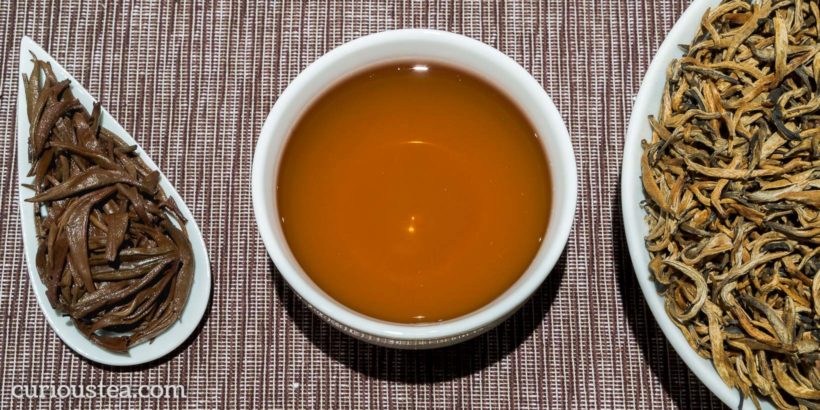
Dian Hong Da Li Cha (滇紅大理茶) is a very unusual black tea grown in Yangta village located in Jinggu Dai and Yi Autonomous County in Pu’er, Yunnan Province. This tea is not made from the usual Camellia sinensis but rather from a different wild strain of Camellia, Camellia taliensis. Grown at a plantation of 40-60 year old trees at an altitude of around 1,700m, it was harvested in March 2021.
The Dian Hong Da Li Cha name for this tea comes from two Chinese parts. Dian Hong (滇紅), literally ‘Yunnan Red’ refers to the type of black tea from Yunnan Province that is very popular and renowned for smooth, malty and sweet flavours. In this case the colour red follows the Chinese classification where teas that are referred to as ‘black’ in the West are called ‘red’ in China. The second part of the name, Da Li Cha (大理茶), literally tea of Dali is one of the common names that is used in Yunnan for Camellia taliensis tea plants. The name most likely originates from the county-level Dali city located in Dali Bai Autonomous Prefecture. We also stock a white version of this tea, Yin Zhen Yunnan Silver Needle in our shop.
This Dian Hong Da Li Cha black tea has striking long golden leaves with a matte black underside. The dry leaves have a strong and appealing sweet and malty aroma. The amber liquor also has a satisfying sweet, floral and malty aroma. The taste is very smooth, this tea exhibits no astringency or bitterness. There are wonderful malty and sweet fruity notes with a long lasting rose floral and mineral aftertaste. Overall this tea produces a lovely cup that is subtly different to the usual black tea selection from Yunnan – truly captivating and intriguing!
We suggest brewing at 90°C for 3-4 minutes according to your taste. It can be brewed around 3 times depending on your taste preferences.
You can also buy Dian Hong Da Li Cha black tea in our online shop.
Santikhiri Milk Ruby Oolong
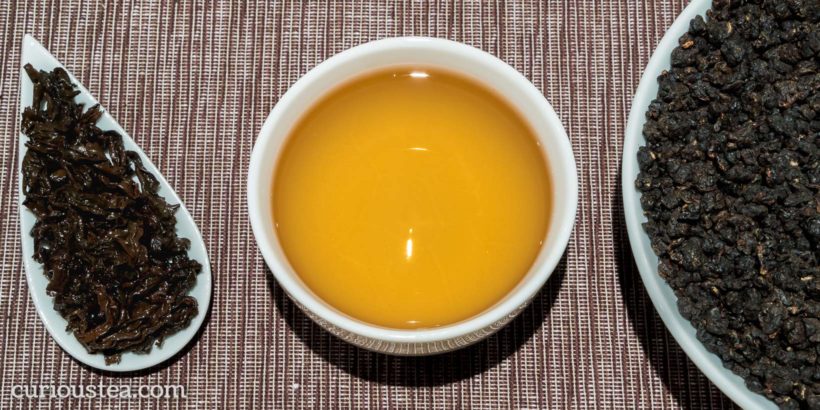
Santikhiri Milk Ruby Oolong is a smooth, highly oxidised oolong that is produced from a Taiwanese Jin Xuan TRES #12 cultivar. This oolong comes from around Santikhiri village (formerly Mae Salong) located in Mae Fa Luang District around the highlands of Doi Mae Salong mountain, close to the border with Burma and Laos. Santikhiri Milk Ruby Oolong is an organic tea grown at an altitude of around 1,200-1,600 metres and this particular lot was plucked in Summer 2021. We source this tea directly from the owner of the plantation in Doi Mae Salong.
When this area of Thailand went from growing opium poppies to sustainable tea growing, many tea cultivars were imported from Taiwan in order to quickly establish a booming tea industry. Taiwanese cultivars were particularly attractive since they matched well the growing conditions of northern Thailand. Furthermore, many consider Taiwanese teas to be of fantastic quality hence fetching a premium price, something Thai tea growers were understandably attracted to. It is safe to say that while teas grown in Thailand still have some way to go in matching the top tier Taiwanese teas, the offerings from Thailand are certainly of very solid quality and generally are at an attractive price point for tea lovers.
Just like the classic lightly oxidised Milk Oolong in this month’s box, it is also made from the Taiwanese Jin Xuan ‘Golden Daylily’ (金萱) or TRES #12 cultivar. However the Ruby version is oxidised to a high degree, almost pushing it into the black tea category. This results in a smooth flavour with attractive fruity and honey notes and zero astringency or bitterness.
Santikhiri Milk Ruby Oolong comes in tightly rolled leaves that open slowly to produce a golden liquor. The flavour profile starts on the tangy and fruity side, progressing onto fuller flavorous that are sweeter with floral notes and a soft creamy mouthfeel. The clean aftertaste is comforting and warming, with lingering notes of acacia honey.
We suggest brewing at 90°C for 3-4 minutes according to your taste. Since the leaves are slow to open we suggest the first infusion to be longer than subsequent infusions. It can be brewed 3+ times.
You can also buy Santikhiri Milk Ruby Oolong tea in our online shop.
We really do hope that you enjoy this tea selection for November and are looking forward to the selection in our next box. Our December box will feature two teas from the Choi family organic tea garden in Boseong, South Korea. The first tea is a classic Sejak ‘sparrow tongue’ spring green tea. To contrast this the next tea that we are featuring is a brand new addition to our selection – a late summer Yeopcha black tea. Our December boxes will also feature a classic light Jin Xuan Oolong from the famous Lugu Township in Taiwan that is a special one-off production. And finally the last tea that we selected is Master Huang’s unique Dan Cong from Guangdong Province of China that is unusually processed as a black tea .
If reading this has made you curious about our teas, but you don’t yet subscribe to a monthly tea selection, you can sign up for our tea boxes in just a few clicks. We ship worldwide from London, UK.
We always love to hear from you, so if you have any questions, suggestions or just want to chat about tea, email us at contact@curioustea.com, via our Facebook page or via Twitter.
You can also follow us on Instagram for pretty tea photos.
Happy tea discoveries!

